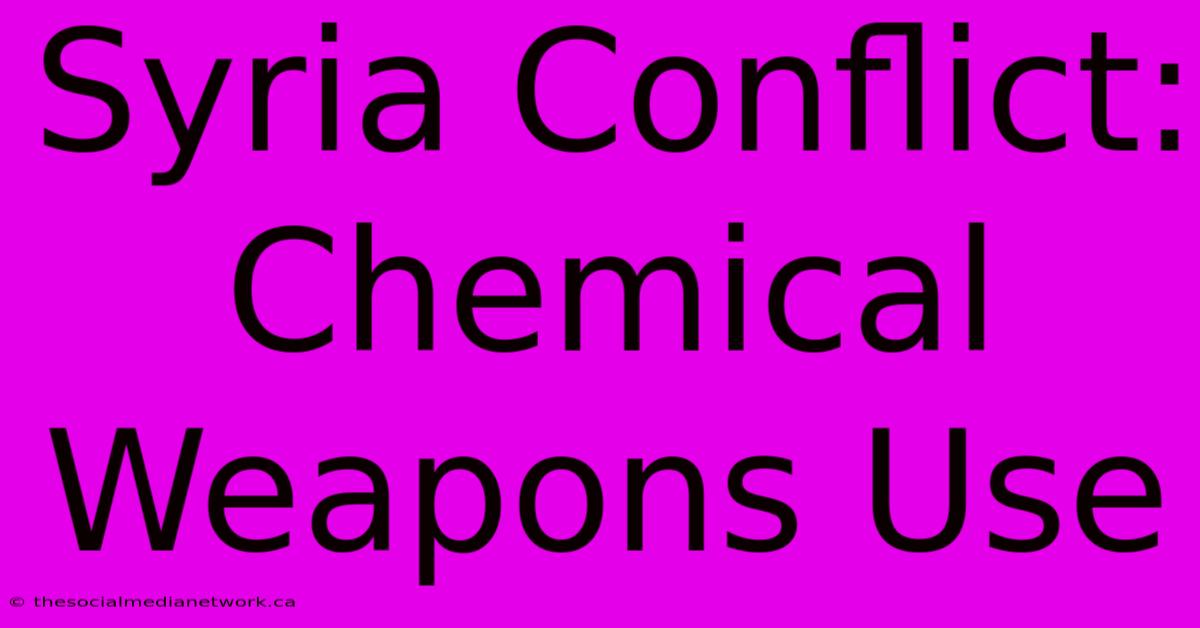Syria Conflict: Chemical Weapons Use

Discover more detailed and exciting information on our website. Click the link below to start your adventure: Visit Best Website meltwatermedia.ca. Don't miss out!
Table of Contents
Syria Conflict: The Shadow of Chemical Weapons
The Syrian Civil War, a brutal conflict that began in 2011, has been marred by numerous atrocities. Among the most horrific and internationally condemned are the repeated allegations and confirmed instances of chemical weapons use. This article delves into the grim reality of chemical weapons deployment in Syria, exploring the key players, the devastating consequences, and the ongoing international efforts to prevent their future use.
The Actors and Allegations: Who Used What, When?
Pinpointing responsibility for specific chemical attacks in Syria remains a complex challenge. The Syrian government, various rebel factions, and even ISIS have been accused at different times. Verifying the source of attacks requires meticulous investigation, often hampered by the chaotic nature of the conflict and the deliberate obfuscation of evidence.
Key Players and Allegations:
- Syrian Government: Accused of using sarin, chlorine, and other chemical agents on numerous occasions, particularly against civilian populations. The most infamous incidents include the Ghouta attacks in 2013.
- Rebel Groups: Some rebel factions have also been accused of using chemical weapons, although on a smaller scale than the government. Verification of these allegations is often difficult due to access restrictions and conflicting reports.
- ISIS (Islamic State of Iraq and Syria): While not extensively documented, there have been allegations of ISIS utilizing chemical agents, primarily improvised explosive devices containing chlorine.
The Ghouta Attack: A Defining Moment
The August 2013 sarin gas attack in Ghouta, a suburb of Damascus, remains a pivotal moment in the Syrian conflict. The scale of the attack, with hundreds of civilian deaths, triggered international outrage and brought the issue of chemical weapons to the forefront of global discussions. While investigations attributed responsibility to the Syrian government, the Assad regime denied involvement. This incident played a crucial role in prompting international intervention, including the destruction of Syria's declared chemical weapons arsenal.
The Devastating Human Cost: Impact of Chemical Weapons
The use of chemical weapons in Syria has resulted in immense human suffering. Beyond the immediate fatalities, survivors often face long-term health problems including respiratory issues, neurological damage, and skin conditions. The psychological trauma inflicted on survivors and witnesses is also profound and long-lasting. Children are particularly vulnerable, with lasting developmental impacts. The widespread use of chlorine gas, while less lethal than nerve agents like sarin, still causes significant respiratory distress and other debilitating effects. The psychological scars of these attacks are often overlooked but are significant aspects of the humanitarian crisis.
International Response and the OPCW
The Organisation for the Prohibition of Chemical Weapons (OPCW), a Nobel Peace Prize-winning organization, plays a crucial role in investigating alleged chemical weapons attacks in Syria. The OPCW's investigations are painstaking and involve collecting samples, interviewing witnesses, and analyzing evidence to determine the origin and nature of the weapons used. Despite significant challenges, their work has been instrumental in documenting the use of chemical weapons and holding those responsible accountable. However, the OPCW's mandate is primarily investigative; enforcement relies on the cooperation of member states.
The Ongoing Challenge: Preventing Future Attacks
The Syrian conflict highlights the persistent danger posed by chemical weapons. Even with the destruction of declared chemical weapons stockpiles, the risk of their use remains. Efforts to prevent future attacks require a multi-pronged approach:
- Strengthening international norms: Reaffirming the absolute prohibition of chemical weapons and enforcing existing treaties.
- Improving investigation capabilities: Providing the OPCW with the resources and access needed to effectively investigate allegations.
- Addressing underlying conflicts: Tackling the root causes of conflict to reduce the likelihood of future chemical weapons use.
FAQ: Addressing Your Questions
Q: Are all chemical weapons the same?
A: No. Chemical weapons vary greatly in their lethality and mechanism of action. Nerve agents like sarin are highly toxic, while others like chlorine gas cause primarily respiratory problems.
Q: What is the OPCW's role in Syria?
A: The OPCW investigates allegations of chemical weapons use in Syria, collects evidence, and publishes reports on its findings. It does not, however, have its own enforcement mechanisms.
Q: What long-term effects do chemical weapons have on survivors?
A: Survivors can experience long-term respiratory problems, neurological damage, skin conditions, and severe psychological trauma. Children are especially vulnerable to long-term developmental impacts.
The Syrian conflict serves as a stark reminder of the devastating consequences of chemical weapons use. While international efforts have made progress in documenting attacks and holding perpetrators accountable, preventing future atrocities requires sustained commitment and collaboration from the international community. The human cost of this conflict is immense and underscores the urgency of finding lasting solutions to peace and security in Syria.

Thank you for visiting our website wich cover about Syria Conflict: Chemical Weapons Use. We hope the information provided has been useful to you. Feel free to contact us if you have any questions or need further assistance. See you next time and dont miss to bookmark.
Featured Posts
-
Wie Viel Geld Bekommt Prinz Marius
Dec 09, 2024
-
Heute Live 2 Liga Rapid Ii Vs Horn
Dec 09, 2024
-
Oxfordshire Lab Studies Tsunamis
Dec 09, 2024
-
Chemical Weapons In Syria Uks Un Plea
Dec 09, 2024
-
Selenskyj Treffen War Trump Fuer Die Verspaetung Verantwortlich
Dec 09, 2024
